|
|
|
Sort Order |
|
|
|
Items / Page
|
|
|
|
|
|
|
| Srl | Item |
| 1 |
ID:
136575


|
|
|
|
|
| Summary/Abstract |
The author describes the importance of school–family relations in establishing a culture of religious tolerance among pupils of a state senior secondary school in the multicultural city of Palangkaraya, Central Kalimantan. Palangkaraya is a provincial capital city, and is home to different ethnicities and religions. In 2001, a massive ethnic riot erupted between the local Dayak and emigrant Madurese in Sampit, a district in Central Kalimantan province, and quickly spread to other districts, including Palangkaraya. This conflict was regarded as a national tragedy and took hundreds of lives. In this post-conflict context, the author examines how several related aspects of school – culture, curriculum and instruction, politics and policies, and school–community relations – contribute to the school's efforts to nurture religious tolerance among students. The data were derived from the author's ethnographic fieldwork in 2010 employing participant observation, focus group discussions and in-depth interviews with the principal, teachers and students. The findings suggest that students have acquired an embodied cultural capital of religious diversity and tolerance from families and community, and that this has equipped them to help create a 'tolerance culture' in the school, despite the unsupportive school politics and inconsistent school policies related to religious diversity. On their own initiative and, to a lesser extent, inspired by the formal curriculum, religion teachers play a pivotal role in shaping students' understanding of religious diversity and tolerance through deliberate teaching about some aspects of other religions.
|
|
|
|
|
|
|
|
|
|
|
|
|
|
|
|
| 2 |
ID:
136667
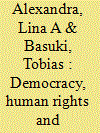

|
|
|
|
|
| Summary/Abstract |
After the transition period, the Yudhoyono administration seems to be more confident to craft incorporate human right factor in to foreign policy consideration. Indonesia, under his leadership, has been very much interested to developed the Indonesia’s soft power diplomacy through the effort to promote democracy and human rights values both regionally and globally. In the beginning of his administration, the ministry of foreign affairs has pursued for promotion and protection of human rights as new principle to be observed by ASEAN member states, and later as one of important pillar in developing ASEAN political security community.
|
|
|
|
|
|
|
|
|
|
|
|
|
|
|
|
| 3 |
ID:
136576


|
|
|
|
|
| Summary/Abstract |
The Moluccas were among the provinces devastated by communal conflict following the fall of the New Order regime in 1998. Peace-building activities were conducted after the violence subsided. The field research for this ethnographic study was conducted in the province from January to December 2009. The objective of the study was to examine the nature and impact of peace education projects supported by foreign agencies in selected schools in the province. The findings show that suspicion and hatred between Muslim and Christian students remained intact in Schools 1, 2 and 3, despite the fact that they received a peace education intervention. In these schools, the peace education projects were framed within what was perceived as Moluccan local tradition. However, School 4 was able to mitigate the effects of the conflict and to nurture peace in the school, despite the fact that it did not receive a specifically tailored peace education intervention. Students of School 4 showed a strong preference for national identity, which encompasses religious and ethnic boundaries. The study indicates that identity politics were at play in the form of the inclusion of what was perceived as Moluccan local tradition but the exclusion of other possibilities in the peace education curriculum, as the cases of Schools 1, 2 and 3 show. The study also shows that school principal leadership was prominent in helping to create a peaceful atmosphere, as the case of School 4 reveals.
|
|
|
|
|
|
|
|
|
|
|
|
|
|
|
|
| 4 |
ID:
136666


|
|
|
|
|
| Summary/Abstract |
This paper seeks to explain the domestic sources of Indonesia’s foreign policy under
SBY’s presidency. It delineates two aspects of Indonesian foreign policy: the enabling
environment that creates opportunities for SBY to pursue a more active participation for Indonesia in many international fora; and the structure and actors that in the past 10 years of Indonesia’s democratic experience have expanded beyond the small circle of elites concerned with foreign policy. This paper suggests that democratization affects Indonesia’s foreign policy establishment in a number of ways. First, political reform that comes as a logical consequence of democratization triggers reform in the heart of foreign-policy making arena. Second, the parliament has also emerged as a new power equipped with some Constitutional rights-to oversee the conduct of Indonesia’s foreign lions. Third, democratization and the political 4 RM it has brought complicate the process of foreign policy making.
|
|
|
|
|
|
|
|
|
|
|
|
|
|
|
|
| 5 |
ID:
136668


|
|
|
|
|
| Summary/Abstract |
This paper seeks to explain the domestic sources of Indonesia’s foreign policy under
SBY’s presidency. It delineates two aspects of Indonesian foreign policy: the enabling
environment that creates opportunities for SBY to pursue a more active participation for Indonesia in many international fora; and the structure and actors that in the past 10 years of Indonesia’s democratic experience have expanded beyond the small circle of elites concerned with foreign policy. This paper suggests that democratization affects Indonesia’s foreign policy establishment in a number of ways. First, political reform that comes as a logical consequence of democratization triggers reform in the heart of foreign-policy making arena. Second, the parliament has also emerged as a new power equipped with some Constitutional rights-to oversee the conduct of Indonesia’s foreign lions. Third, democratization and the political 4 RM it has brought complicate the process of foreign policy making.
|
|
|
|
|
|
|
|
|
|
|
|
|
|
|
|
| 6 |
ID:
136574


|
|
|
|
|
| Summary/Abstract |
Religiosity education is an alternative to Catholic religious education in some Catholic schools in Yogyakarta. In religiosity education students learn to appreciate different religions. It was started in 1982 by the late Father Y.B. Mangunwijaya, and later developed by the Commission of Religious Education in the Diocese of Semarang (which includes Yogyakarta). This development took place at a time of tension for Christian schools, because, under the terms of a new law, they had to offer religious education specific to every student's religion. Religiosity education was successfully developed as a new curriculum, which met the criteria of multicultural education. Unfortunately, when the government Education Office in Yogyakarta did not accept religiosity education as an alternative to Catholic religious education, most Catholic schools withdrew from implementing it. The future of religiosity education in Yogyakarta was uncertain. However, this research shows that much Catholic religious education is currently undertaken in the same way as religiosity education, using the reflective pedagogy paradigm. So the spirit of religiosity education remains in these schools – though without the actual term. The paper argues that the spirit of religiosity education should be maintained in Catholic schools in Yogyakarta in order to contribute to making Yogya a true 'city of tolerance'.
|
|
|
|
|
|
|
|
|
|
|
|
|
|
|
|
| 7 |
ID:
136573
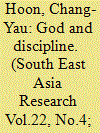

|
|
|
|
|
| Summary/Abstract |
A school is an institution in which student subjectivity is constituted and reinscribed through various 'disciplinary technologies'. The interplay between discipline and discipleship in the practice of Christian education is mutually constitutive. Through the study of a Protestant Christian school in Jakarta, this article explains the disciplinary technologies deployed by the school in its inculcation of discipline and character building. By examining the school's religious education practices the study provides insight into the perceptions of the school management, teachers and students with regard to various ethical, moral and religious issues. The author considers how Christian schools can develop critical reflective skills and respect for differences, and so can contribute to a tolerant, peaceful and multicultural Indonesia.
|
|
|
|
|
|
|
|
|
|
|
|
|
|
|
|
| 8 |
ID:
136387
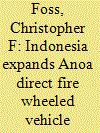

|
|
|
|
|
| Summary/Abstract |
Like many countries across the Asia-Pacific region, Indonesia traditionally imported its armoured fighting vehicles (AFVs) but in a push to become more self-sufficient and ameliorate the risk of supplies being cut off for political reasons, it is developing a range of platforms including a new direct-fire vehicle based on the indigenously developed Anoa-2
|
|
|
|
|
|
|
|
|
|
|
|
|
|
|
|
| 9 |
ID:
135574
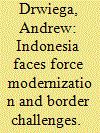

|
|
|
|
|
| Summary/Abstract |
With a new civil government in place, Indonesia’s military expenditure will still expected to be directed at continuing the modernization of the Indonesia Armed forces as well as the country’s defence industrial base.
|
|
|
|
|
|
|
|
|
|
|
|
|
|
|
|
| 10 |
ID:
135578
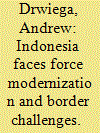

|
|
|
|
|
| Summary/Abstract |
With a new civil government in place, Indonesia’s military expenditure will still expected to be directed at continuing the modernization of the Indonesia Armed forces as well as the country’s defence industrial base.
|
|
|
|
|
|
|
|
|
|
|
|
|
|
|
|
| 11 |
ID:
136669


|
|
|
|
|
| Summary/Abstract |
The Yudhoyono administration appeared to rely on two distinct strategies to preserve national and international security. At one level, it relies on multilateral –oriented diplomacy to institutionalize liberal norms and mechanism including confidence building, cooperative security and peaceful conflict settlement in order to build a cohesive international order. At another level, the Indonesian government sought to modernize to country’s military capabilities and enhance its autonomy for arms.
|
|
|
|
|
|
|
|
|
|
|
|
|
|
|
|
| 12 |
ID:
134604


|
|
|
|
|
| Summary/Abstract |
This article examines political exile as a particular form of migration, with reference to Indonesians living in the Union of Soviet Socialist Republics (USSR) when the military regime came to power in their homeland. With the rise in Jakarta of the New Order under Major-General Suharto after 1 October 1965, thousands of Indonesians in socialist and communist states abroad were effectively isolated. Faced with detention or execution if they returned home, Indonesian leftists and other dissidents who were scattered across some dozen states spanning the Sino-Soviet divide became unwilling exiles. Several thousand Indonesians were then studying in the USSR, where they were one of the largest foreign nationalities in Soviet universities and military academies. Many spent nearly half a century as exiles, struggling to survive first the vicissitudes of the cold war and then the global transformations that came with the dissolution of the USSR in December 1991. The most influential grouping of Indonesians who remained in the USSR after 1965 was known as the Overseas Committee of the Indonesian Communist Party. In China, a separate party leadership emerged, known as the Delegation of the Indonesian Communist Party. Mirroring Sino-Soviet rivalries, the Delegation urged Indonesian leftists in the USSR to join them in China. Hundreds did so. These rival factions were separated by mutual distrust until they each disbanded toward the close of the cold war. This article analyzes the changing fate of Indonesians caught in the contradictory relationship between New Order Indonesia and the USSR and in the tensions between the USSR and China as these unwilling exiles were buffeted by geopolitical transformations well beyond their influence.
|
|
|
|
|
|
|
|
|
|
|
|
|
|
|
|
| 13 |
ID:
136671


|
|
|
|
|
| Summary/Abstract |
Development cooperation is an important dimension of international relations, thus has become an integral part of the foreign policy of many countries. Indonesia has always aspired to be a global player, despite of its limitations. As SBY has always shown keen interest in foreign policy, during his tenure, Indonesia embarked on a more serious effort to become an active player in international development cooperation. This arncle discusses the efforts taken by the Government of Indonesia to advance its role in the international development cooperation architecture during the Susilo Bambang Yudhoyono presidency, in particular in the context of development cooperation being carried out as a tool for foreign policy. This article argues that although Indonesia has tended to consider development cooperation as a useful tool of foreign policy, a lot of work is clearly to be done. Development cooperation is not yet closely aligned with the realization of Indonesia’s economic objectives. If a country manages to use development cooperation for both strengthening its soft power (image) and promoting more tangible interests, it can be regarded as pursuing a “smart power” strategy.
|
|
|
|
|
|
|
|
|
|
|
|
|
|
|
|
| 14 |
ID:
136672


|
|
|
|
|
| Summary/Abstract |
Although Susilo Bambang Yudhoyono claims that he has stabilized the situadon in Papua, his policies on Papua as a matter of fact. have faced limitations. Papua remains one of the poorer provinces in Indonesia and, under his presidency, Violence and conflicts escalated, while human rights abuse cases continue. These issues served as fertile triggers for the internationalization of Papua, where unresolved problems in Papua have raised the interest of other countries so that they voice their coricern over the mishandling of Papua and place it under the international agenda; This article will observe cases of Papua internationalization and the diplomatic responses and challenges during SBY’s administration. This article argues that the internationalization of the issue Papua’s self—determination is attributed to two factors: continuous internal domestic 'failure' to promote welfare and human in Papua and Indonesia’s 'diplomacy weaknesses.’
|
|
|
|
|
|
|
|
|
|
|
|
|
|
|
|
| 15 |
ID:
135725


|
|
|
|
|
| Summary/Abstract |
Shaivism is one of the oldest belief systems in the world. The remnants as well as existing temples in Thailand, Laos, Champa (Vietnam) Indonesia, China, Korea, Japan Central Asia and Tibet speak of the spread of Shaivism in the far corners of the world, from its origin in India. In India, the Shaiva tradition continues uninterruptedly. The twelve Jyotirlinga’s situated at different centres from Kashmir to Rameshwaram stand to prove its widespread existence. The names of the regions like Telegu region;1 Trissur2 in Kerala come from names of Shiva, and Shiva temples exist in huge numbers in the map of India which also includes Nepal. Its form and traditions may though differ from region to region. The most common image is the one described in Sangam Literature, a deity with three eyes, blue throat, and matted hair decorated with goddess Ganga and a crescent moon. The supreme one with a divine consort.
|
|
|
|
|
|
|
|
|
|
|
|
|
|
|
|
| 16 |
ID:
136670


|
|
|
|
|
| Summary/Abstract |
In general, the position of Indonesia within the roadmap for peace in the Middle East has not been highly regarded internationally‘. However, as a Muslim—majority nation, Indonesia’s international appeal derives from its success in managing transition to democracy, the friendly and tolerant form of moderate Islam practiced
by the majority of Indonesian Muslims, and the active participation of civil society in the efforts of democratic consolidation. This paper reviews Indonesian foreign policy m the Middle East during the ten years of President Susilo Bambang Yudhoyono’s leadership. This paper addresses the following questions: How does Yudhoyonds “a million friends, zero enemy” policy apply to the Middle East? Is there any domestic factor that shaped Yudhoyono’s policy toward the Middle East? Is there any electoral or national interest objective behind the conception Yudhoyono’s policy? This paper focuses on Yudhoyono’s policy toward l\/[iddle Eastern countries before and after the Arab Spring and it will also include a thorough analysis on Yudhoyono administrations stance in regards to the Israeli—Palestinian conflict.
|
|
|
|
|
|
|
|
|
|
|
|
|
|
|
|
| 17 |
ID:
136953


|
|
|
|
|
| Summary/Abstract |
The palm oil industry exemplifies the ‘regionalisation without regionalism’ pattern seen in other industries in Asia: extensive, regionally concentrated transnational economic integration accompanied by a low level of formal regional institution-building. Production is concentrated in Malaysia and Indonesia, and Asian countries account for a major share of the market for intermediate products. The ownership structure of palm oil production reflects the dominance of transnational Malaysian and Singaporean firms. There is no authoritative regional institution governing production, investment standards or labour in the industry. A patchwork of both enabling and regulatory governance institutions supports the industry. These are formal and informal, public and private, and are situated at multiple levels: within, below and across the nation state. Although the governance structure surrounding the palm oil industry has supported it well in terms of production volumes and profits, large externalities—environmental and social costs—persist. This article argues that the governance failures associated with the industry stem from different stakeholders' competing interests in contexts of highly unequal wealth and power distribution. Misgovernance is not an unintended consequence of institutions failing to keep up with markets in scale and scope, but is embedded in the multilevel governance regime that supports, and partially regulates, the industry.
|
|
|
|
|
|
|
|
|
|
|
|
|
|
|
|
| 18 |
ID:
134704


|
|
|
|
|
| Summary/Abstract |
This research explains the politics of financial reforms in Indonesia by applying the theory of veto players. By comparing the periods during and after the International Monetary Fund (IMF) programs, I analyze temporal variations in the effects of the IMF and the number of veto players on financial reforms in Indonesia.
|
|
|
|
|
|
|
|
|
|
|
|
|
|
|
|
| 19 |
ID:
136138


|
|
|
|
|
| Summary/Abstract |
Reducing Emissions from Deforestation and Forest Degradation (REDD+) is an ambitious global programme oriented towards improving forest carbon management. It aims to attract new sources of ‘green’ capital to fund emissions reductions from avoided deforestation and sustainable forest management. REDD+ is transforming forest conservation, as a diverse array of new stakeholders become involved. Not surprisingly, REDD+ has proved divisive, as critics concern themselves with issues of power, justice, and commodification, while practice-oriented researchers tackle similar issues from different perspectives, focusing on benefit sharing, safeguards, additionality, measuring and verification. In this paper we explore the different roles of critical and practical research, and argue that there is a need for greater sharing of knowledge across current divides. We draw on our own experiences of conducting a research project on REDD+ in Indonesia that involved critical and practice-oriented researchers. We argue that critical research disconnected from practical matters can have perverse outcomes for practitioners who are ultimately working towards similar goals; while uncritical practice-oriented research has the potential to lead to a dilution of core values of environmental justice and conservation. In contrast, forms of practical critique provide ways of researching REDD+ that have practical value while maintaining critical insights.
|
|
|
|
|
|
|
|
|
|
|
|
|
|
|
|
| 20 |
ID:
136572


|
|
|
|
|
| Summary/Abstract |
This paper argues that recent inter-religious conflict in Indonesia highlights a need for the education system to address problems of religious intolerance through religious education and the religious culture in schools. The position of religion vis-à-vis the state and education indicates that such action is appropriate in the Indonesian context. The paper analyses approaches to inter-faith education and education for religious tolerance globally, and addresses some of the issues that arise. It then turns to Indonesia, outlining the curricula for religion as a school subject and recent changes in the education system. The ethnographic section of the paper examines how three exceptional private faith schools – one Islamic and two Catholic – in Yogyakarta and West Sumatra offer new ways of teaching inter-religious tolerance. The paper demonstrates how religious education in schools can foster inter-religious tolerance and understanding.
|
|
|
|
|
|
|
|
|
|
|
|
|
|
|
|
|
|
|
|
|